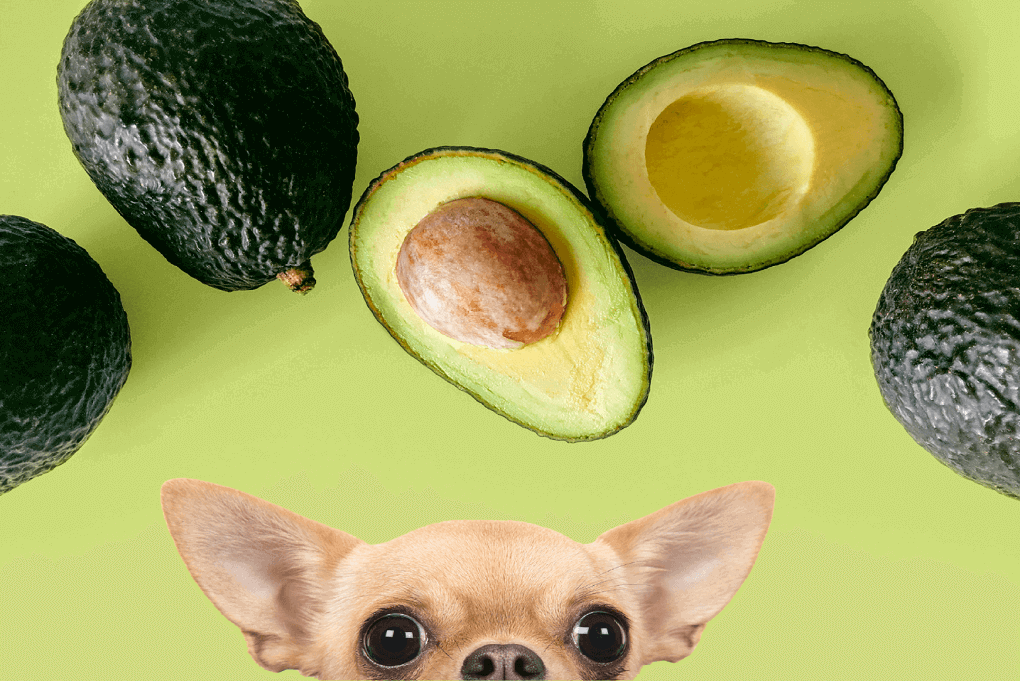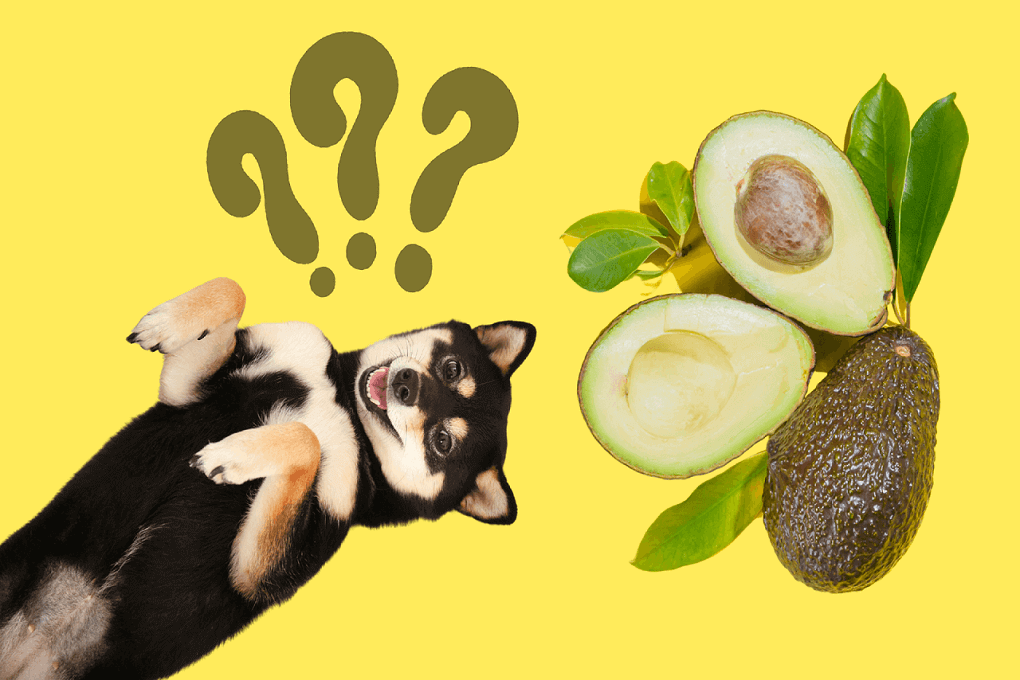We all love sharing our favorite foods with our furry friends, but there are certain human foods that are actually dangerous for dogs. One surprising culprit (Can Dogs Eat Avocado?)? Avocados!
While they might be a healthy staple in our kitchen, avocados contain a toxin called persin that can cause serious health problems in dogs, even in small amounts. So, before you share your guac with your pup, keep reading to find out why avocados are a big no-no for dogs, and what other delicious treats you can share with your furry best friend instead.
What is Avocado Poisoning?

Avocado poisoning is a condition caused by ingesting any part of the avocado plant, including the fruit, leaves, bark, and pit. The culprit behind this toxicity is a fungicidal toxin called persin. While the exact amount of persin needed to cause harm is unknown, it’s crucial to remember that even small quantities can be fatal to dogs.
Can Dogs Eat Avocado?
While some sources might claim a tiny amount of avocado flesh is safe, it’s best to err on the side of caution and avoid giving your dog any avocado at all. The persin content varies within the fruit, making it impossible to determine a completely safe amount. Additionally, the high-fat content in avocados can lead to gastrointestinal upset and pancreatitis in dogs, even without the presence of persin.
Can Dogs Eat Guacamole?
Guacamole, a popular dip made from avocado, is a definite no-no for dogs. Besides containing avocados, it often includes other ingredients like onions and garlic, which are also toxic to canines.
Can Dogs Have Avocado Oil?
Commercially processed avocado oil, when refined and free of any avocado flesh remnants, is generally considered safe for dogs in small amounts. However, it’s crucial to consult your veterinarian before introducing any new food to your dog’s diet, including avocado oil.
Can Dogs Eat Avocado Skin and Seeds?
Absolutely not! Both the skin and the pit of an avocado are particularly dangerous for dogs. The skin contains the highest concentration of persin, and the pit is a choking hazard, potentially causing intestinal blockages if swallowed.
Symptoms of Avocado Poisoning in Dogs
If your dog ingests any part of an avocado plant, be on the lookout for the following signs of poisoning:
- Vomiting
- Diarrhea
- Difficulty breathing
- Abdominal pain
- Weakness
- Lethargy
- Pancreatitis (symptoms include nausea, vomiting, abdominal pain, and fever)
Causes of Avocado Poisoning in Dogs
The primary cause of avocado poisoning in dogs is the ingestion of any part of the avocado plant, containing the toxic compound persin. This can happen through:
- Eating dropped avocado pieces
- Chewing on avocado trees or leaves
- Getting into a compost bin containing avocado remnants
Diagnosis of Avocado Poisoning in Dogs
If you suspect your dog has consumed avocado, it’s crucial to seek immediate veterinary care. The veterinarian will likely perform a physical examination and may recommend additional tests like:
- X-rays or ultrasounds to locate the avocado pit in case of ingestion
- Blood tests to assess organ function
How Vets Treat Dogs That Ate Too Much Avocado?
The treatment for avocado poisoning in dogs depends on the severity of the symptoms and the amount ingested. It may involve:
- Inducing vomiting to remove any remaining avocado from the stomach.
- Administering activated charcoal to absorb toxins.
- Providing intravenous fluids to prevent dehydration caused by vomiting and diarrhea.
- Monitoring for signs of pancreatitis and providing supportive care if needed.
- Surgical intervention to remove the avocado pit if it causes an intestinal blockage.
Recovery of Avocado Poisoning in Dogs
The recovery time for avocado poisoning depends on the severity of the case. With prompt veterinary treatment, most dogs recover fully within a few days. However, in severe cases, complications can arise, requiring additional treatment and potentially leading to long-term health issues.
Healthy alternatives to Avocado for Dogs
While dogs cannot enjoy the creamy goodness of avocado, there are plenty of other safe and healthy alternatives that can provide them with similar nutritional benefits:
Healthy Fats
- Salmon oil: Rich in omega-3 fatty acids, promoting healthy skin and coat, and supporting joint health.
- Flaxseed oil: Another good source of omega-3 fatty acids, also beneficial for skin and coat health.
- Coconut oil: Offers medium-chain triglycerides, promoting healthy digestion and energy metabolism.
- Olive oil: Contains monounsaturated fats, potentially offering heart health benefits. (Always consult your vet before introducing olive oil to your dog’s diet.)
Fruits and Vegetables
- Bananas: A good source of potassium and fiber, but offer them in moderation due to their sugar content.
- Blueberries: Packed with antioxidants and beneficial for cognitive function.
- Carrots: Provide beta-carotene for healthy vision and are a good source of fiber.
- Green beans: Low in calories and rich in fiber and vitamins.
- Apples: A healthy source of fiber and vitamins, but remove the core and seeds first.
Other Alternatives
- Sweet potato: Offers complex carbohydrates, vitamins, and fiber.
- Pumpkin: A good source of fiber and can help with digestive issues.
- Plain yogurt: Contains probiotics for gut health, but choose yogurt free of artificial sweeteners and xylitol, which is toxic to dogs.
Always consult your veterinarian before introducing any new food to your dog’s diet, even if it’s considered safe for dogs in general.
- Introduce new foods in small quantities to avoid stomach upset.
- Maintain a balanced diet for your dog based on their age, breed, and activity level.
By offering these safe and healthy alternatives, you can provide your furry companion with the nutrients they need while ensuring their safety and well-being.
Never Ever Feed Avocado to Your Dogs!
It’s crucial to remember that avocados are simply not meant for dogs. The potential health risks associated with their consumption far outweigh any benefits. By keeping avocados out of your dog’s reach and educating yourself about the dangers of this seemingly harmless fruit, you can help ensure their safety and well-being.
If you suspect your dog has ingested avocado, don’t hesitate to seek immediate veterinary attention. Remember, early intervention is key to a full recovery.




